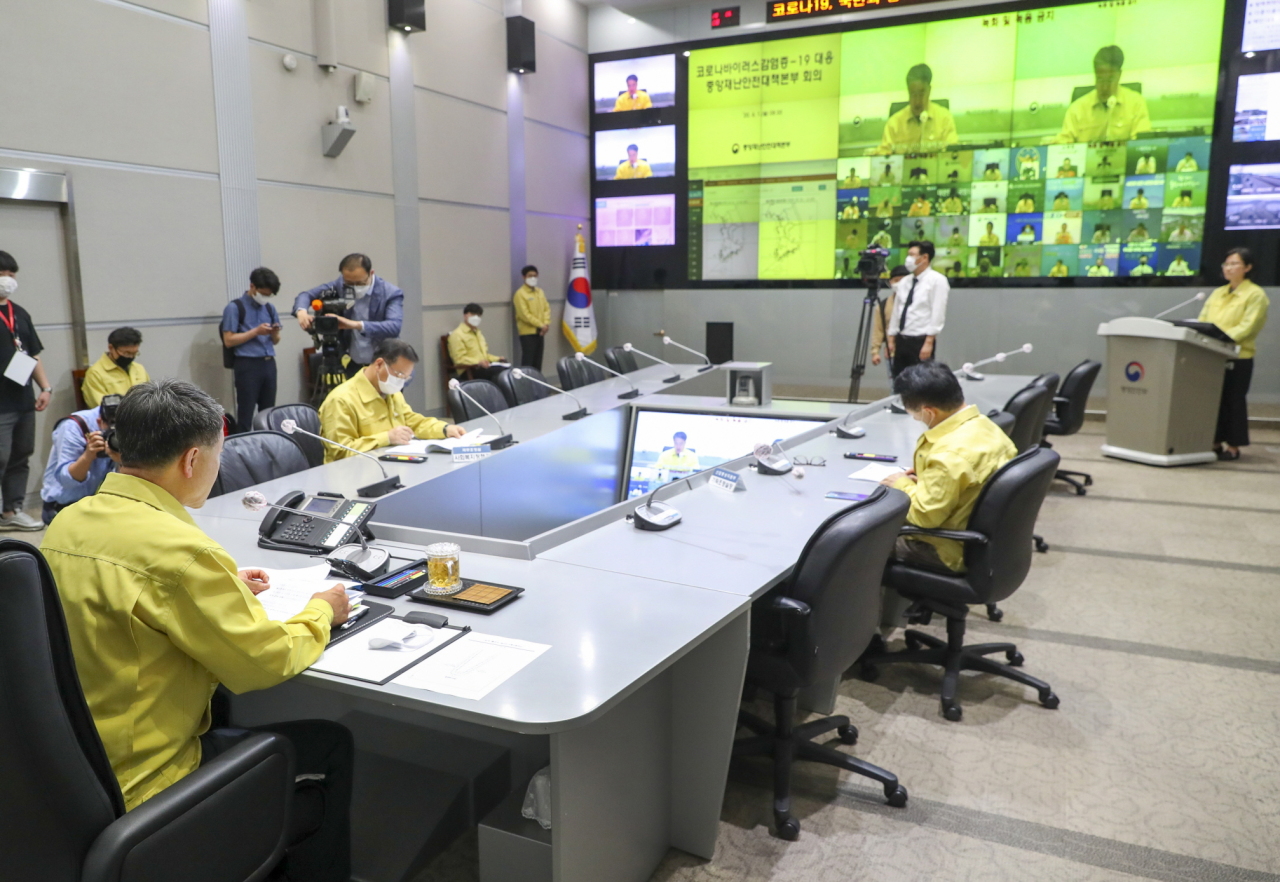S. Korea tries out QR registration for coronavirus tracing
After a week’s trial, QR code scanning to be mandatory at risky venues
By Kim ArinPublished : June 1, 2020 - 10:22

A weeklong trial run of QR registration of visitors will take place from Monday through Sunday at three cities in South Korea, to be introduced nationwide starting June 10 amid renewing outbreaks.
Korea on Monday reported 35 new cases of the novel coronavirus, which causes the respiratory illness COVID-19.
Thirty of the cases newly confirmed in the 24 hours ending Sunday midnight were via local transmission, health officials said, while the other five were recent travelers from overseas -- three from the United States and two from Europe.
Seoul and the adjacent areas of Gyeonggi Province and Incheon accounted for over 90 percent of the locally transmitted cases.
In the face of the coronavirus flaring up in the metropolitan region, Korea has instituted another two weeks of intense social distancing in Seoul, Gyeonggi Province and Incheon, to last until June 14.
Speaking in a Monday press briefing, the Korea Centers for Disease Control and Prevention Director Jung Eun-kyeong said transmission routes of recent infections can be categorized into three: religious gatherings, large workplaces such as logistics facilities and call centers, and private tutoring academies locally known as hagwon.
In-person congregations are still highly discouraged, she said, urging virtual meetings where possible. “Non-face-to-face manner of interactions is necessarily the ‘new normal,’” she said.
In all settings where people gather, steps to reduce physical contact such as maintaining a 2-meter distance, keeping rooms well-ventilated and wearing face masks are needed, she added.
“As the crisis prolongs, following through with the precautions can be exhausting. But until COVID-19 goes away, we all have to make an effort to make our homes, workplaces and schools a safe place from infections,” she said.
In Incheon, which added 18 patients, an active outbreak was investigated to be linked to a protestant church pastor, 57, who had tested positive the previous day. The pastor had visited 10 churches in the Incheon area while still infectious, sickening 11 other pastors, city officials said.
For a week from Monday, 19 venues in three cities -- Seoul, Incheon and Daejeon -- have been designated to carry out a trial run of a visitor registry program using smartphone QR codes.
With the new digitized system, those visiting places deemed to be at “high risk” will submit their personal details by scanning the QR codes generated on their mobile phones, information of which is to be discarded in four weeks. The data will be accessible to no third parties and by government officials only.
The government has said the digital registry is intended to expedite the contact tracing process, which has been impeded by missing information and dishonest accounts.
“A day’s delay in reporting on a patient’s part can put the entire country on hold for a month,” Prime Minister Chung Sye-kyun warned after a meeting with health officials last month.
After the seven-day trial period, businesses and other facilities considered to have a high contagion risk will be required to digitize the log of all visitors. This includes bars and other nightlife establishments, karaoke lounges and indoor sports and concert venues.
In a Monday meeting of the Central Disaster Management Headquarters, Minister of Health Park Neung-hoo said the coronavirus situation was alarming, as patient numbers are “still fluctuating” and untraceable cases continue to rise.
The Health Ministry has said about 6 to 7 percent of new daily cases in the past month were from unidentified sources.
As for school openings, the minister said students, teachers and other staffers should refrain from going to class when having symptoms.
“Stay home when feeling unwell for yourself and to protect those around you,” he said.
Seoul has been testing all symptomatic students and faculty members from May 20 amid phased openings of in-person classes.
High school seniors were first to return to school on May 20, followed by high school juniors, freshmen, first and second graders and preschoolers on May 27. This coming Wednesday is turn for high school sophomores, third, fourth and seventh graders.
The Education Ministry has said in an announcement Friday that schools in regions experiencing ongoing outbreaks will adjust opening accordingly.
Since the first case was discovered on Jan. 20, Korea has tested 921,391 people, to find that 11,503 had contracted the disease. Of those, 10,422 have already recovered, while 271 have died.
Korea’s massive tracing program has put vast numbers of people in self-quarantine.
The Interior and Safety Ministry said as of Sunday, 37,812 people were placed under home quarantine, an increase of 1,600 from the day before. Among them, 28,924 are overseas arrivals and 8,888 are contacts of locally infected patients.
A total of 480 people have violated quarantine orders, with 12 of them wearing noncompulsory movement-tracking wristbands designed for monitoring movements of quarantined individuals.
By Kim Arin (arin@heraldcorp.com)


![[AtoZ into Korean mind] Humor in Korea: Navigating the line between what's funny and not](http://res.heraldm.com/phpwas/restmb_idxmake.php?idx=644&simg=/content/image/2024/04/22/20240422050642_0.jpg&u=)


![[Herald Interview] Why Toss invited hackers to penetrate its system](http://res.heraldm.com/phpwas/restmb_idxmake.php?idx=644&simg=/content/image/2024/04/22/20240422050569_0.jpg&u=20240422150649)
![[Graphic News] 77% of young Koreans still financially dependent](http://res.heraldm.com/phpwas/restmb_idxmake.php?idx=644&simg=/content/image/2024/04/22/20240422050762_0.gif&u=)








![[Exclusive] Korean military to ban iPhones over security issues](http://res.heraldm.com/phpwas/restmb_idxmake.php?idx=652&simg=/content/image/2024/04/23/20240423050599_0.jpg&u=20240423171347)



![[Today’s K-pop] Ateez confirms US tour details](http://res.heraldm.com/phpwas/restmb_idxmake.php?idx=642&simg=/content/image/2024/04/23/20240423050700_0.jpg&u=)